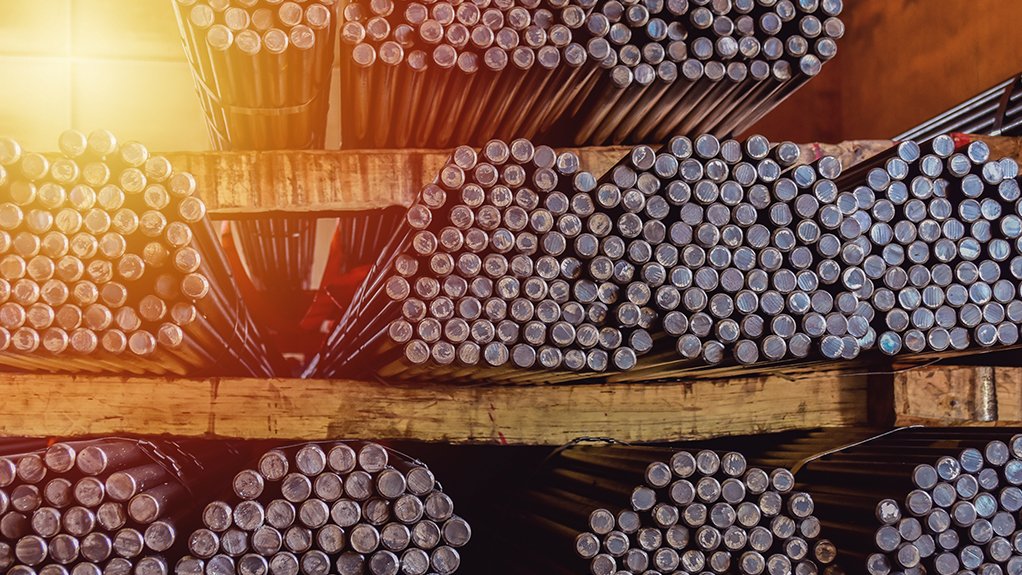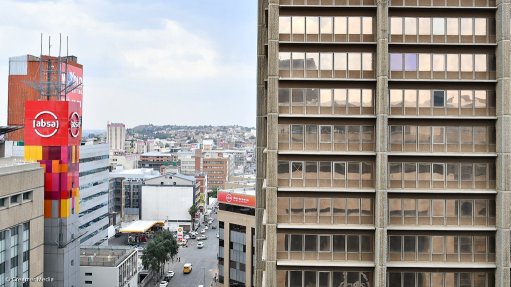Downstream companies implore ArcelorMittal South Africa, govt to avoid long steel plant closures
The South African downstream steel industry has urgently appealed to both steel producer ArcelorMittal South Africa (AMSA) and the government to find immediate solutions that will allow the continued operation of the three AMSA plants that make up the company’s long steel business in South Africa.
AMSA announced in November last year that the company would embark on a process to wind down its long steel business. The company cited the current low market demand and national constraints beyond the company’s control, such as the extreme challenges in both logistics and energy supply in the country, and steel-related policy decisions that create an uncompetitive and unlevel playing field for the company against its local competitors.
More than 20 industry associations, including three scrap recycling associations, and industry experts came together in a crisis summit in Johannesburg on January 17 to determine an urgent plan of action to prevent the imminent closure of the AMSA plants.
The industries represented at the summit included construction, automotive, mining, electro-technical, electricity transmission, aerospace and defence, rail, wire, fasteners, concrete reinforcing, cladding and roofing, and rail, most of them dependent on AMSA as the only local producer capable of supplying the bulk of their required long product steel input.
The downstream operations are a critical part of the South African steel supply chain. According to a recent estimate by the Steel and Engineering Industries Federation of Southern Africa (Seifsa), downstream operations currently offer direct employment to about 270 000 people, or 90% of South Africa’s total steel industry employment, in a process that begins with mill-produced basic materials and ends with finished goods sold to consumers, both local and international.
In his address to the summit, AMSA CEO Kobus Verster repeated previous assertions that the company’s main request was a level playing field. He also requested that AMSA be afforded the same tariffs on energy and transport as other producers, and that existing policy interventions on scrap metal, which give an unfair advantage to local scrap-based minimill competitors, be removed.
At the summit, experts highlighted challenges in the current steelmaking landscape in South Africa. A key contributor to the uncompetitiveness of the South African steel industry is the considerable overcapacity in local long steel production.
The total current local steelmaking capacity for long products is 4.25-million tonnes a year with the current local demand sitting at only 1.25-million tonnes a year. This will be exacerbated by substantial additional capacity from minimills that are currently being supported by government funding.
The minimills exclusively use scrap steel for their iron content. Owing to the capacity, capability and quality constraints of the minimills, the formal downstream industries can only use a very limited quantity of the minimills’ output, making the general and informal industries the main clients of the minimills.
AMSA’s 1.7-million-tonne-a-year Newcastle blast furnace is currently the only local mill capable of producing long steel from iron-ore. The company’s Vereeniging electric arc furnace has further capacity of 250 000 t/y, producing high-quality and speciality steels from scrap.
The Vereeniging operation is currently idled, meaning that the bulk of the long steel demand is met by the Newcastle furnace, which cannot be switched on and off like a minimill.
The long steel requirements of the formal downstream, which only the AMSA mills can supply, equates to about 35% of current local demand, being about 400 000 t to 450 000 t.
Although AMSA facilities historically enjoyed a substantial market share of the other 65% of local demand, this has been significantly eroded in recent years since the implementation of the Scrap Price Preference System (PPS) in 2013, favouring scrap-based mills.
A stated purpose of the intervention was “… the regulation of exports to guarantee an affordable supply of quality scrap metal, to safeguard employment, and to promote infrastructure development”.
The policy, which dictates that scrap must be offered to local scrap smelters at discounts of between 30% and 40% on the international price, was expected to be in effect for five years.
However, despite evidence that the policy intervention had not achieved its desired outcome by 2016, and that parts of the scrap-processing industry experienced substantial decline leading to closures and job losses, the PPS is still in force a decade later. In fact, many new entrants are attracted to the scrap smelting industry because of the support of the PPS.
The current investment exposure of the Industrial Development Corporation (IDC) in the scrap smelting industry is estimated at more than R14-billion, with R3.3-billion added in the past four years. Importantly, during the same period, three of the scrap smelters enjoying IDC support went into liquidation, were placed in business rescue or closed their doors to business entirely.
A scrap recycling association presentation to the summit estimated the nett subsidy to scrap smelters since 2013 is about R50-billion. The subsidy is not borne by the scrap recycling industries but directly passed on and borne by the legitimate owners of scrap, including the downstream industry.
As would be expected in an oversupplied market, the drop in demand, coupled with the ever-growing but highly subsidised capacity, has in the past decade already led to many casualties, and the imminent AMSA closures are not likely to be the last.
The unanimous agreement among the downstream steel associations is that the impact of the imminent AMSA plant closures will be devastating, not only for the local steel and manufacturing sectors but for the entire South African economy.
At the Crisis Summit, several industry associations shared that the steel shortages that will result from this decision will likely lead to almost immediate production stoppages at many downstream plants over a range of dependent subindustries. It could even lead to the closure of industries that are completely reliant on the supply of long steel from AMSA.
A submission by a major local automotive original equipment manufacturer (OEM) at the Crisis Summit highlighted the potential impacts of the closure.
The OEM said the closure would set its localisation programme back by at least seven years owing to the loss of about 7% of its unique local steel content. Moreover, it put current plans to localise a further 30 000 t of steel-based components at risk.
The OEM said its international principals were losing confidence in South Africa and possibly even omitting its local entities from new developments in the future, including new electric vehicle programmes. In addition, assembly line stoppages could also be expected because of changes to supply chains for safety critical components, which take up to 38 months to crash test and implement.
The automotive industry currently consumes about 70 000 t/y of AMSA-supplied long steel product. However, the knock-on effect from the loss of local related sub- and full-assemblies is estimated to be about R35-billion a year.
In the short term, about 30 000 jobs in the automotive industry are expected to be impacted, including suppliers and backward linkages. This number is expected to grow in the medium to longer term.
In the short term, replacing the total lost supply with imports is not being viewed as a viable option for most long steel consumers, given the longer supply chains to import primary products or finished goods, which are currently compounded by transport and logistics challenges in South Africa.
Also, some products have been developed uniquely for South African conditions and are therefore not available on international markets.
Another expected consequence of the AMSA closure will be an increase in the imports of finished goods to replace locally manufactured goods, placing South Africa’s already fragile manufacturing sector at even further risk.
The South African downstream steel industry said in a joint statement on January 24 that “… it is almost impossible to estimate the exact losses over the medium to long term but, owing to the anticipated domino effect, it could result in hundreds of thousands of job losses and billions of Rands lost to our economy.
“It is for this reason that the downstream steel industry is collectively calling for AMSA and the government to urgently find a sustainable solution that will allow the company to keep its long steel business open and to ensure that the South African steel industry can continue to contribute to the growth and development of the South African economy.”
Article Enquiry
Email Article
Save Article
Feedback
To advertise email advertising@creamermedia.co.za or click here
Press Office
Announcements
What's On
Subscribe to improve your user experience...
Option 1 (equivalent of R125 a month):
Receive a weekly copy of Creamer Media's Engineering News & Mining Weekly magazine
(print copy for those in South Africa and e-magazine for those outside of South Africa)
Receive daily email newsletters
Access to full search results
Access archive of magazine back copies
Access to Projects in Progress
Access to ONE Research Report of your choice in PDF format
Option 2 (equivalent of R375 a month):
All benefits from Option 1
PLUS
Access to Creamer Media's Research Channel Africa for ALL Research Reports, in PDF format, on various industrial and mining sectors
including Electricity; Water; Energy Transition; Hydrogen; Roads, Rail and Ports; Coal; Gold; Platinum; Battery Metals; etc.
Already a subscriber?
Forgotten your password?
Receive weekly copy of Creamer Media's Engineering News & Mining Weekly magazine (print copy for those in South Africa and e-magazine for those outside of South Africa)
➕
Recieve daily email newsletters
➕
Access to full search results
➕
Access archive of magazine back copies
➕
Access to Projects in Progress
➕
Access to ONE Research Report of your choice in PDF format
RESEARCH CHANNEL AFRICA
R4500 (equivalent of R375 a month)
SUBSCRIBEAll benefits from Option 1
➕
Access to Creamer Media's Research Channel Africa for ALL Research Reports on various industrial and mining sectors, in PDF format, including on:
Electricity
➕
Water
➕
Energy Transition
➕
Hydrogen
➕
Roads, Rail and Ports
➕
Coal
➕
Gold
➕
Platinum
➕
Battery Metals
➕
etc.
Receive all benefits from Option 1 or Option 2 delivered to numerous people at your company
➕
Multiple User names and Passwords for simultaneous log-ins
➕
Intranet integration access to all in your organisation





















